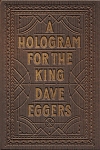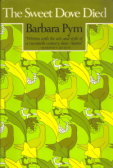 “Reading books by men exhausts me,” I told my husband crossly.
“Reading books by men exhausts me,” I told my husband crossly.
I am in the middle of Dave Eggers’ Hologram for the King, a beautifully-crafted novel about a failed Schwinn bicycle salesman/executive turned IT salesman in Saudi Arabia; he spends his days waiting for a meeting with the king in a city barely under construction.
Eggers is a brilliant writer, the founder of McSweeney’s, and the winner of countless awards. This book was recommended by many readers I respect.
 It is not that I don’t admire Eggers’s fascinating, multi-layered novel, which required enormous research and is yet a very fast read. Eggers explores the consciousness of Alan Clay, a divorced 54-year-old American who has lost his dream of manufacturing and selling beautiful bicycles. He has made and lost a fortune over the years, is in debt and about to lose his house, and cannot pay the college tuition for his daughter if he doesn’t make the deal in Saudi.
It is not that I don’t admire Eggers’s fascinating, multi-layered novel, which required enormous research and is yet a very fast read. Eggers explores the consciousness of Alan Clay, a divorced 54-year-old American who has lost his dream of manufacturing and selling beautiful bicycles. He has made and lost a fortune over the years, is in debt and about to lose his house, and cannot pay the college tuition for his daughter if he doesn’t make the deal in Saudi.
The scenes are very vivid: the desert, the drives, the sea, the drinking in hotel rooms, the lack of a sense of time, the surreal embassy party, and a road trip with his taxi driver. Eggers seamlessly weaves history and politics into the elegant narrative: a history of Schwinn, the history of American manufacturing being transferred to China, the politics and culture of Saudi Arabia.
It is a very well-written, architecturally solid book, but the very breadth exhausts me. And I do feel the male voice is sometimes draining. It’s not just Alan: it’s many male characters in many books by men. Hemingway, Fitzgerald, Delillo, Tom Wolfe, etc.
Let’s just sit down and have a cup of tea with Barbara Pym before I get back to Eggers. Since Thursday is Valentine’s Day, I am recommending Eggers’ Hologram and four other unromantic novels as gifts for both men and women.
 William Cooper’s Scenes from Provincial Life and Scenes from Metropolitan Life. These charming autobiographical novels about a physics-teacher-turned-civil-servant are the first two in a series of five autobiographical novels praised by such “angry young men” as Kingsley Amis and John Braine.
William Cooper’s Scenes from Provincial Life and Scenes from Metropolitan Life. These charming autobiographical novels about a physics-teacher-turned-civil-servant are the first two in a series of five autobiographical novels praised by such “angry young men” as Kingsley Amis and John Braine.
The narrator, Joe Lunn, a novelist, is quietly rebellious. In Scenes from Provincial Life, published in 1950 and set in the ’30s, he describes the boredom and the politics of teaching at a boys’ school, a job he takes strictly to support his writing. He is having an affair with Myrtle, an advertising illustrator who wants to marry him, and he loves to go to bed with her, but cannot imagine being married. Their hours at a weekend cottage sometimes overlap with those of Joe’s pushy gay friend, Tom, an accountant who insists that he needs more time with his lover, Steve. Tom’s overwrought relationship with Steve is observed with some amusement by Joe, but his own with Myrtle is equally complicated. There are many scenes between men and women, and men and men. And the relationships change as time passes.
In Scenes from Metropolitan Life, a post-war novel I really think is a minor classic, Joe is a civil servant in London, working in a government office with his friend, Robert, a novelist we know slightly from Provincial Life. The descriptions of the politics of the workplace are superb, and the mechanizations of Dr. Chubb, an engineer transferred to their department, to usurp Joe’s job, are funny, horrendous, and suspenseful. (Dr. Chubb reminds me of Widmerpool in Dance to the Music of Time.)
Love affairs are at the heart of the book: Joe again meets Myrtle, who is married to a soldier still not demobilized, and they embark on an affair; Robert has an affair with the beautiful, neurotic Julia, who claims to be married to a Polish officer. The men want to marry, and the women sometimes do, sometimes do not. Very funny, very realistic, and worth reading on its own.
 Barbara Pym’s The Sweet Dove Died. This sophisticated novel is not your typical in-love-with-the-vicar kind of Barbara Pym novel. When the heroine, Leonora Eyre, faints after buying a book about the language of flowers at an auction, Humphrey and his nephew, James, both antique dealers, help her outside, take her to lunch, and befriend her. Leonora, a middle-aged beauty, falls chastely in love with the sexually ambiguous Ned, while Humphrey falls more sexually in love with her. Leonora’s dislike of sex precludes consummation of either relationship.
Barbara Pym’s The Sweet Dove Died. This sophisticated novel is not your typical in-love-with-the-vicar kind of Barbara Pym novel. When the heroine, Leonora Eyre, faints after buying a book about the language of flowers at an auction, Humphrey and his nephew, James, both antique dealers, help her outside, take her to lunch, and befriend her. Leonora, a middle-aged beauty, falls chastely in love with the sexually ambiguous Ned, while Humphrey falls more sexually in love with her. Leonora’s dislike of sex precludes consummation of either relationship.
And when Leonora learns that James is having an affair with a young woman, she schemes wickedly to get her out of the picture. Then an American assistant professor, Ned, who has seduced James on vacation, proves to be Leonora’s match.
Funny and so beautifully written.
 3. Ursula K. Le Guin’s The Left Hand of Darkness. I recently reread this science fiction classic, which won both the Hugo and the Nebula Awards in 1969; alas, I had to return it to the library before I wrote about it, so I’m afraid this will be sketchy. Set on the planet Winter, Genly Ai, an envoy, must try to persuade the inhabitants that other solar systems and species exist and that it will be to their advantage to join an inter-planetary coalition. His main contact, Estraven, the king’s chief advisor, falls out of favor, and after he is banished, Ai, too, must leave. Both end up across the border in the same surfacely reasonable but actually cruel country, and Estraven saves Ai from a concentration camp. The two dangerously escape by sled across glaciers.
3. Ursula K. Le Guin’s The Left Hand of Darkness. I recently reread this science fiction classic, which won both the Hugo and the Nebula Awards in 1969; alas, I had to return it to the library before I wrote about it, so I’m afraid this will be sketchy. Set on the planet Winter, Genly Ai, an envoy, must try to persuade the inhabitants that other solar systems and species exist and that it will be to their advantage to join an inter-planetary coalition. His main contact, Estraven, the king’s chief advisor, falls out of favor, and after he is banished, Ai, too, must leave. Both end up across the border in the same surfacely reasonable but actually cruel country, and Estraven saves Ai from a concentration camp. The two dangerously escape by sled across glaciers.
Le Guin describes the cold so sharply that I had to put on more blankets. She obviously knows a lot about winter camping. The escape scenes are full of practical details about how much weight to carry and how much or little food one must eat.
The novel is complicated by the concept of kemmer: people on Winter do not have one sex. They go into kemmer, taking on the characteristics of either a man or a woman, and can be biologically both mothers and fathers. Genly Ai’s close relationship with Estraven raises sexual questions.
LeGuin writes beautifully, and the book is written as an anthropological report containing Ai’s observations, Estraven’s journal entries, tales, etc.

I know what you mean about male authors! I’m reading “Infinite Jest” by David Foster Wallace AND “Cloud Atlas” and I haven’t been able to finish either, although I do enjoy and admire the writing and the genius behind both. It’s the lack of emotional connection — I don’t think about these books, or their characters, when I’m not reading them. When I am, it’s all in the head and little to nothing in the heart, which is, yes, exhausting. Some female authors are guilty of the same emotional detachment, but not the ones I most enjoy.
I’ve read the Pym, a long time ago, and have miraculously kept it in spite of all my many moves over the years. The Ursula Le Guin sounds promising; I haven’t read anything by her in a long time.
LikeLike
The Left Hand of Darkness is one of my all-time-favorite books. Kemmer, the monthly assigning of the body to be temporarily male or female, is central to the novel. We think we know who we are but, as Ai finds out, we are embedded in our gender concepts. Ai is permanently male, which he regards as normal, but on Winter he is referred to as “the pervert.”
LikeLike
Sherry, I do tend to read more books by women than men. I haven’t read David Foster Wallace. He is on my list, and we found a copy of Infinite Jest for $1 at a slae. Yet I find it hard to commit to very long books unless they’re classics, and I’m not sure whether Wallace falls into this category for me. I’ll start with some of his short stories, I think.
Eggers is good, and this book is very short, thank God! But I seem to have the “opposite” tastes of many male readers I respect, and somehow this isn’t my kind of thing. It’s not Eggers’s fault: it’s my taste.
Nancy, yes, I love Le Guin and this has stood the test of time. I tried to persuade some people in an SF reading group to read it and they said NO! I do recommend this to everyone. I believe Le Guin had an influence on Doris Lessing–or perhaps the ideas were just in the air, I don’t know.
LikeLike
Pingback: The Barbara Pym Centenary & An Academic Question | mirabile dictu
Pingback: 100 Essential Sites for Voracious Readers – Masters in English
Pingback: 100 Essential Sites for Voracious Readers - Masters in English